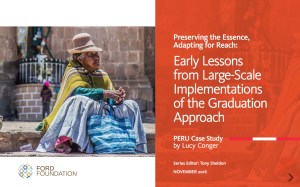The challenge
Although Peru has made significant strides in reducing poverty in recent years, a significant portion of the population, primarily in the country’s rural regions, live in extreme poverty. Millions of Peruvians lack access to clean water, proper sewage systems, health care, electricity, formal education and financial services. Though Peru began distributing conditional cash transfers to the extreme poor, policymakers recognized that the transfers alone were insufficient to spark the significant changes ultimately necessary to address extreme poverty.
What we did
Though a formal evaluation had not been done at the time of the case study’s writing, a survey of participants conducted before Haku Wiñay completed its three-year cycle indicated the impacts of the program. Sixty-three percent of participants had increased their annual income by nearly USD 300 as a result of the program. The growth in income led participant families to shift their labor to salaried activities that offer better pay. Haku Wiñay participants reported that they were more knowledgeable about business and had improved negotiating skills. Due to the Healthy Housing component, participants’ diets improved notably and the more efficient stoves had become permanent home fixtures.
Some initial key lessons learned from the project’s implementation are:
- Haku Wiñay program’s design includes alternative ways to embed many of the key goals of life skills coaching, such as developing self-confidence and building social capital. Recruiting trainers/coaches from the local communities and creating local decision-making structures are among the ways that Haku Wiñay addresses the softer skills and social development goals generally included in the life skills coaching component.
- Peer training–the contracting of local farmers (known as Yachachiqs) to train participating farmers–is considered a key to the success of Haku Wiñay. The use of peer trainers reduces barriers to communications to a minimum and builds trust.
- Haku Wiñay successfully built on more than two decades of experience in Peru with local implementing committees of elected farmers administering government funds. The purchase of assets and their transfer to families is managed by community representatives, an efficient structure for delivering assets on a national scale that also enhances local participation and empowerment.
- Stronger expertise in value chains that can link rural areas with larger markets should be developed as part of the Haku Wiñay expansion. Market analysis as conventionally understood has not been a part of Haku Wiñay program activities. This lack of market analysis is not specific to the program but rather is characteristic of Peru generally. Senior officials and field staff alike recognize that there is a lack of information for identifying markets for participants’ products and for understanding how to link farmers with markets.
- Asset transfer and skills training will have a greater impact if complemented with government efforts to strengthen infrastructure (e.g., roads and telecommunications). If the settlements of Haku Wiñay participants become less isolated, they will have greater access to information and markets and gain more leverage for market transactions.
